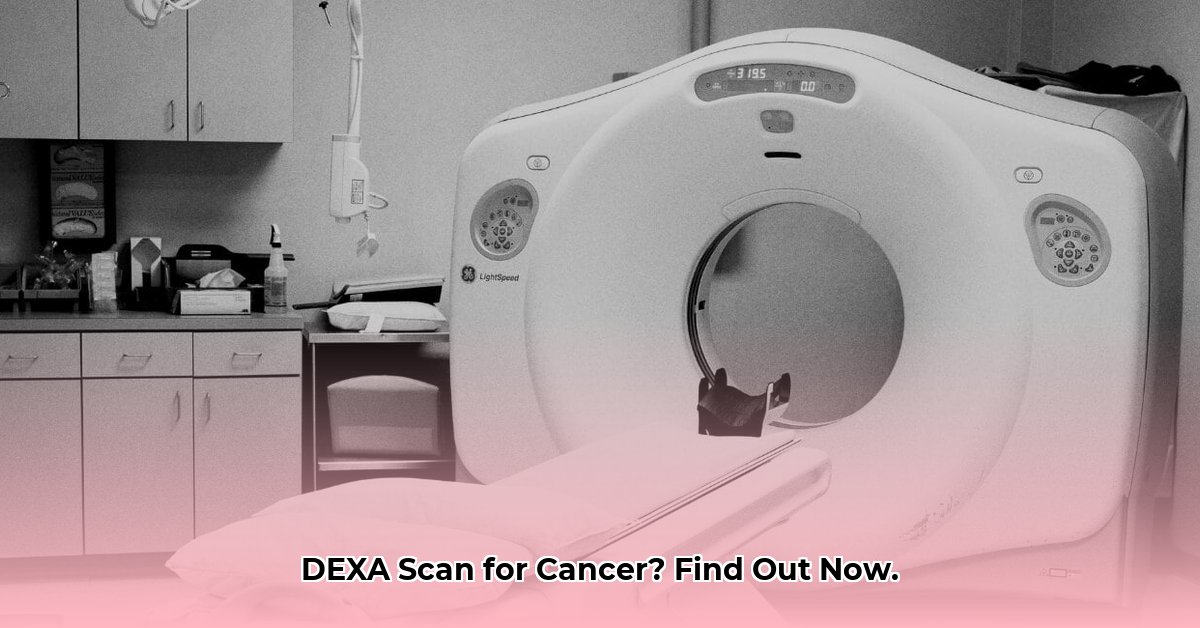A DEXA scan is a valuable tool for assessing bone health, but it’s not typically used to detect cancer. This article explains what a DEXA scan is, its purpose, and why it’s not the primary test for cancer detection. We’ll also explore other diagnostic tests used for cancer screening and guide you on what to do if you have concerns.
Understanding DEXA Scans
What is a DEXA Scan?
A DEXA (Dual-Energy X-ray Absorptiometry) scan is a specialized X-ray that measures bone mineral density. It uses very low doses of radiation—much lower than a standard X-ray—to determine the amount of calcium and other minerals in your bones. This measurement, often expressed as a T-score, helps doctors assess bone strength and fracture risk. A DEXA scan is the gold standard for diagnosing osteoporosis, a condition where bones become weak and brittle.
[Include a visual aid here – a diagram comparing a DEXA scan to a standard X-ray]
What Does a DEXA Scan Really Show?
DEXA scans primarily reveal your bone health status. They help identify:
- Bone Density: The amount of mineral content in your bones.
- Osteoporosis Risk: The likelihood of developing osteoporosis and experiencing fractures.
- Fracture Risk: Your overall susceptibility to bone fractures.
While a DEXA scan might incidentally reveal bone abnormalities, it cannot diagnose the cause of those abnormalities, including cancer.
DEXA Scans and Cancer: Debunking the Myth
Can DEXA Scans Detect Cancer Directly?
No, a DEXA scan is not designed to detect cancer directly. Its primary purpose is to assess bone health and fracture risk. However, there are some nuances to this.
Can DEXA Scans Indirectly Suggest Cancer?
In some cases, a DEXA scan might indirectly reveal signs that suggest the possibility of cancer, particularly if it has spread to the bones (bone metastasis). Cancer in the bones can sometimes cause changes in bone density, which a DEXA scan might detect. However, the DEXA scan itself cannot confirm a cancer diagnosis. It simply flags the density change, which then requires further investigation.
Why Isn’t DEXA a Primary Cancer Screening Tool?
DEXA scans are not sensitive enough to detect most cancers, especially in their early stages. They also cannot differentiate between bone density changes caused by cancer and those caused by other conditions, such as osteoporosis or old injuries.
Alternative Cancer Diagnostic Tests
If cancer is suspected, doctors use a variety of specialized tests, including:
- X-rays: While X-rays can sometimes detect bone abnormalities, they aren’t as detailed as other imaging tests.
- CT Scans (Computed Tomography): Use X-rays and computers to create detailed cross-sectional images.
- MRI Scans (Magnetic Resonance Imaging): Use magnetic fields and radio waves to produce high-resolution images, particularly useful for soft tissues.
- PET Scans (Positron Emission Tomography): Use a small amount of radioactive material to track cell activity, often highlighting cancerous cells.
- Bone Scans: Specifically designed to detect bone abnormalities, including cancer spread to the bones.
- Biopsies: A small tissue sample is examined under a microscope to confirm a cancer diagnosis.
- Blood Tests: Certain blood tests can detect cancer markers, although these are not always definitive.
Concerned About Cancer? Next Steps
If you’re worried about cancer, consult your doctor. They can:
- Evaluate your individual risk factors and symptoms.
- Recommend appropriate screening tests based on your situation.
- Provide personalized advice and support.
Early detection is often crucial for successful cancer treatment, so don’t hesitate to seek professional medical advice if you have any concerns.
Frequently Asked Questions (FAQ)
| Question | Answer |
|---|---|
| Does bone density affect cancer risk? | Some cancers can weaken bones or spread to them, indirectly affecting bone density. However, low bone density doesn’t mean you have cancer. |
| Are there different types of bone cancer? | Yes, including osteosarcoma and chondrosarcoma. A specialist can provide more information about specific types if bone cancer is suspected. |
| How do I find a doctor for cancer screening? | Start with your primary care physician. They can assess your risk, discuss your concerns, and refer you to a specialist if needed. You can also search online directories provided by reputable organizations like the American Cancer Society. |
| Can supplements improve bone density? | Some supplements, like calcium and Vitamin D, can support bone health. It’s essential to consult your doctor before starting any supplements, as they can interact with other medications. |
| What lifestyle changes can improve bone density? | Weight-bearing exercise, a balanced diet rich in calcium and vitamin D, and avoiding smoking and excessive alcohol consumption can all contribute to stronger bones. |
Ongoing Research and Future Directions
Research into the relationship between bone density, cancer, and the potential for DEXA scans to play a larger role in cancer detection is ongoing. Some studies suggest that future advancements in DEXA technology might enhance its ability to contribute to cancer screening. However, it is important to acknowledge the limitations of current knowledge. While promising developments may emerge, DEXA scanning is not currently a reliable standalone tool for cancer diagnosis. Consult your doctor for personalized recommendations based on your individual circumstances and the latest scientific evidence.
- Borosilicate Glass Food Storage for Freshness and Organization - January 31, 2026
- Borosilicate Food Containers for Durable and Safe Everyday Use - January 30, 2026
- Borosilicate Glass Meal Prep Containers Offer Durable Oven-Safe Storage - January 29, 2026










